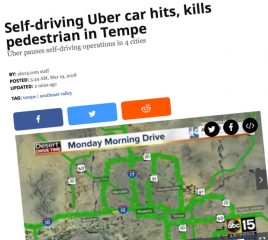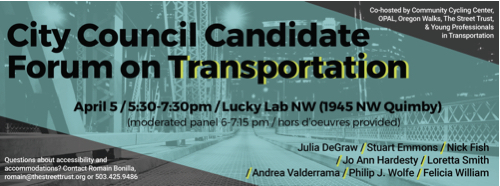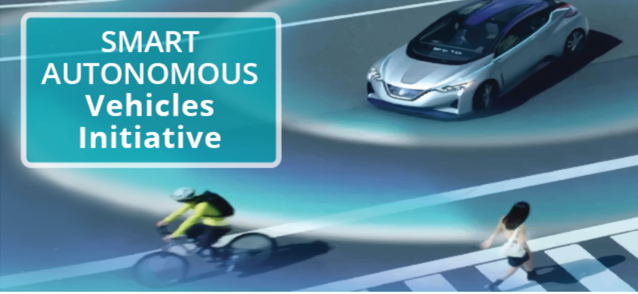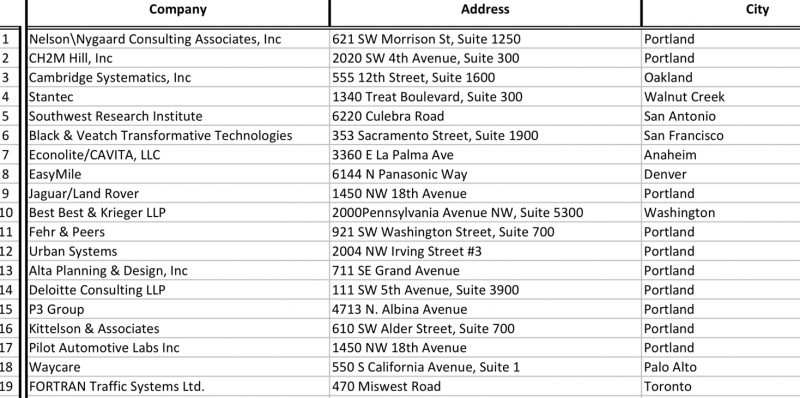Uber has been testing its new self-driving cars on human subjects since last year and now it appears one of them has killed a person who was walking across a street. The collision happened in Tempe, Arizona late last night. According to a local news report, “Tempe Police says the vehicle was in autonomous mode at the time of the crash and a vehicle operator was also behind the wheel.”
This is the second self-driving Uber (that we know about) that has been involved in a collision. Last month a local news station in Pittsburgh reported that one of them slammed into another car while in self-driving mode.
After last night’s death, Uber has announced it will immediately end its testing in Tempe and Pittsburgh, as well as San Francisco and Toronto.
Thankfully in Portland our local leaders and transportation officials have not allowed a private company to test their deadly product on humans.
Back in April the Portland Bureau of Transportation launched their Smart Autonomous Vehicle Initiative (SAVI). In doing so Portland made it clear it welcomed innovative companies to try new autonomous vehicle (AV) products and services here; but only if safety was the number one priority.
In July, PBOT released a Request for Information aimed at companies like Uber. “If you want to test your technology, we are game to work with you,” PBOT staffer Ann Shikany proclaimed in a webinar with potential respondents, “But before we just start testing, we want to understand what’s out there.” It was PBOT’s attempt to, “Begin engagement with the private sector in a more intentional way.”
19 companies responded. It doesn’t look like Uber is on the list…
The RFI itself makes it clear that any companies who want to test AV tech must first prove it does not conflict with our Vision Zero Action Plan. They also told prospective companies that no AV testing permits would be accepted until all City of Portland regulations were completed.
Here’s one of six goals of the SAVI effort that relates to safety:
Ensure the safety of our residents and businesses by requiring AV providers to align with our Vision Zero goal to eliminate all traffic deaths and serious injuries by 2025. AVs must show that they can and will stop or avoid pedestrians, bicyclists, animals (to include domestic, game and livestock), disabled people, emergency vehicles, red lights, and stop signs.
PBOT Project Manager Peter Hurley emphasized during the webinar that if/when a company is selected to test here they must start in a “controlled situation” that’s not in the public right-of-way. Ann Shikany added, “We’re thinking it might be more of a closed track, obstacle course situation in an industrial area rather than a heavily pedestrian-trafficked residential street.” (Last night’s fatal collision in Tempe occurred in a suburban setting at an intersection of two large arterial roads.)
“We don’t want to be passive respondents to this technological change,” Hurley said at a bicycle advisory committee meeting last August, “We want to have a proactive role.”
So far PBOT has made a valiant effort to protect us from the dangers of irresponsible companies like Uber. We’re grateful for that.
For more on Portland’s Smart Autonomous Vehicle Initiative, check out the city’s website.
— Jonathan Maus: (503) 706-8804, @jonathan_maus on Twitter and jonathan@bikeportland.org
Never miss a story. Sign-up for the daily BP Headlines email.
BikePortland needs your support.
The post Portland’s cautious approach to AVs should prevent what just happened in Tempe appeared first on BikePortland.org.
from BikePortland.org http://ift.tt/2HNjO4b





No comments:
Post a Comment